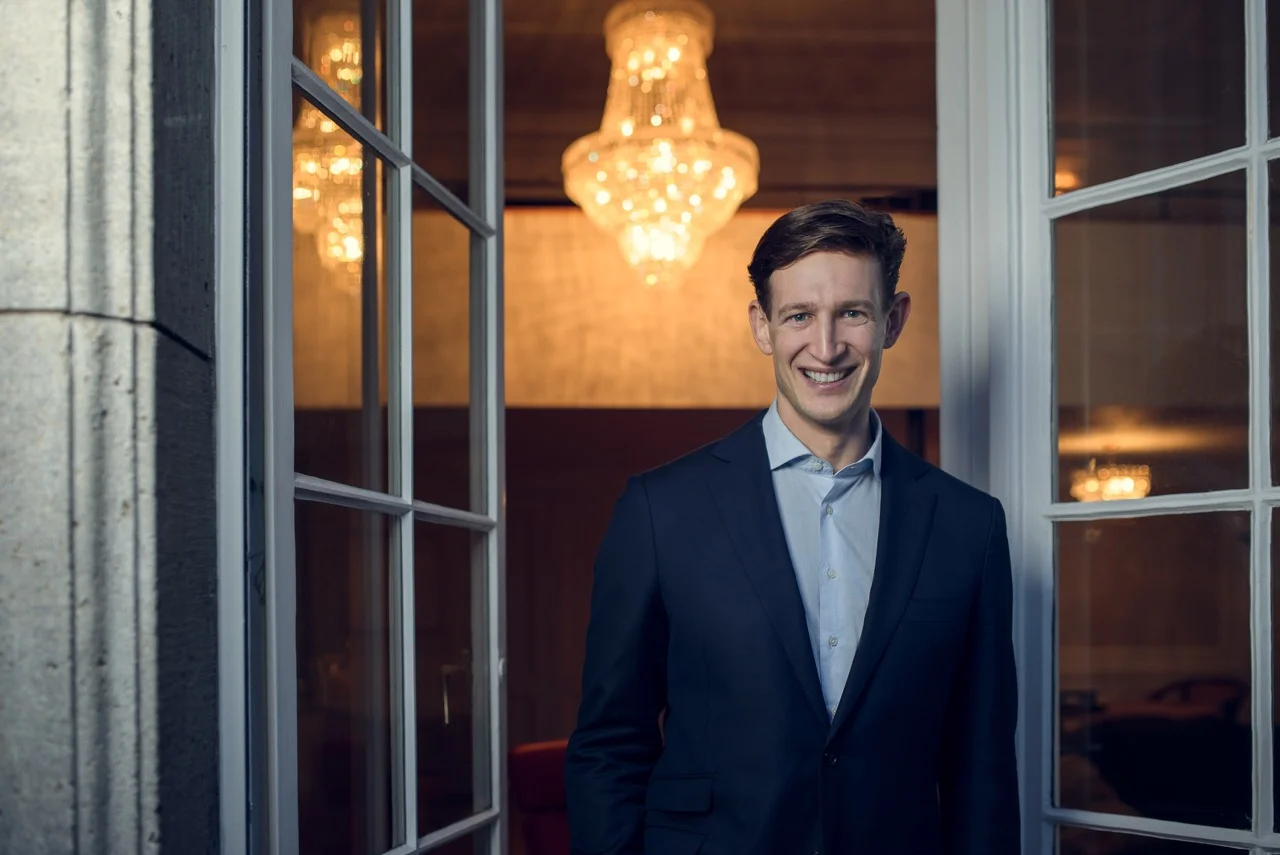Q&A with
Maestro
Evan Rogister
KCOHO musicians Karen Lowry-Tucker and Adria S. Foster recently interviewed Aida conductor Evan Rogister on the magnificent rooftop terrace of the Kennedy Center, surrounded by spectacular views of the monuments.
What is your musical and educational background?
I actually knew from a very young age that I wanted to be a conductor! When I was about four I saw a video of Leonard Bernstein. Apparently I’d request my favorite records, stand on the hearth of our fireplace and wave my arms along to the music. That interest was very much reinforced by my grandmother, who was an opera singer, voice teacher and pianist. She was my first teacher, and she used to play me LP’s of all the “bread and butter” classical repertoire, and eventually when I was old enough she became my first music teacher. She took me to the North Carolina Symphony (I grew up in Raleigh) so I got into it really early. I remember that afternoons at her house were full of music. Looking back at all the wonderful teachers I’ve had, I’d put my grandmother up there with the best of them. Her love and appreciation of quality music making—she had tremendously high standards—was deeply instilled in me.
I studied trombone at Indiana University, and I was loving that, but Indiana has the most remarkable opera facility--it’s based on the blueprints of the MET and at that time they were producing 8 operas a year! I saw that and said, “I’ve got to be involved with this, too.” So, inspired by the opera program at IU, I ended up switching from trombone to vocal studies. During graduate school at Juilliard I said, “Okay, it’s time to start conducting!” After a year of formal conducting study at the Peabody Institute, I got a job at the Houston Grand Opera as an assistant, and that led to an audition at the Deutsche Oper Berlin which was a big opportunity.
Tell us a bit about what you have coming up.
Following Aida here at the Kennedy Center, I’m conducting the Brahms Requiem in Malmö, Sweden and then I come home to New York to make my MET debut conducting Mozart’s Magic Flute.
And we know that you are about to do the Ring Cycle. How exciting!
Yes, in Gothenburg, Sweden. It will be a new production so we’re literally starting from scratch. The process of casting and planning rehearsals for such a mammoth undertaking is fascinating. I’m really lucky that I’ve had the experience of assisting on two other cycles--with Robert Spano on the Seattle Opera Ring, and I assisted Donald Runnicles on the Deutsche Oper Cycle.
Our second trombonist Doug Rosenthal said he was going to play the bass trumpet (music from The Ring) for you. What were you hoping to learn from that?
Yes, we had a nerdy session last night after Aida! For starters, Doug let me play the instrument. I wanted to have the actual sensation, because it’s not an instrument we encounter that often. Doug’s really accomplished on it, remarkably so– it’s very impressive. The instrument has a special round, dark tone and the potential for lots of agility; I think if more players could play the bass trumpet like that it probably would appear more in the repertoire. Doug demonstrated a lot of licks, and also talked about what the hang-ups are—for instance register breaks and the stamina required across 5 hour operas. It’s extremely helpful to know these things about rarer instruments.
So, what else are you doing to prepare for The Ring?
Well, it’s interesting that you asked. One of the most enriching experiences I’ve had in the past few years has been to work with a musician in Munich named Richard Trimborn. It wouldn’t be an exaggeration to call Trimborn legendary. In 2013, a close friend moved to Munich, heard somebody playing piano in the flat above her, and quickly realized that this gentleman was the former head of the music staff of the Bayerischen Staatsoper during the tenure of Wolfgang Sawallisch. In addition to that, he was the best friend and musical assistant of Carlos Kleiber. Kleiber and Trimborn were a team who meticulously and SLOWLY prepared all of the Kleiber recordings that we now consider legendary. His experience reached back to projects with Herbert von Karajan, Karl Böhm and even Hans Knappertsbusch. Trimborn sadly passed away this fall, but over the past 4 years I’ve gone to Munich many times to prepare scores with him. We’ve worked on Wagner, Strauss, Mozart and Tchaikovsky. It’s amazing because when he opened his score you almost couldn’t see the printed notes anymore, there are so many pencil markings. You’d see ‘KA’ in shorthand, and he said, “Well, this is how Karajan handled this bar but, if you want an alternative this is how ’S’ (Sawallisch) conducted it and I think this is more successful because….” It’s all that history and tradition, which I think is really important to our field.
What other conducting influences are there? What conductors inspire you past and present?
My major mentors are Donald Runnicles, Patrick Summers and Alan Gilbert. Patrick came to conduct in Baltimore when I was at Peabody and generously created a position for me at the Houston Grand Opera. Maestro Runnicles took me on as his assistant in Berlin and I really owe him for allowing me to conduct Wagner and Strauss early on. He tossed me into Tannhauser and Rienzi in my first year! I studied symphonic repertoire with Alan Gilbert at Juilliard--fantastic guy, an amazing musician. Of the older generation, my hero is Bernard Haitink. I had the opportunity to conduct on a masterclass with him at Juilliard and it was amazing to witness his mastery up close.
How do you compare the experience of conducting symphony vs. opera?
What feeds me artistically in opera is the immediate connection to drama, which provides us with a clear direction, momentum and responsibility to tell stories. I think that is a gift that we get in opera that we have built in. So, I try to let that inform symphonic work. I’m biased, but I happen to believe that starting one’s career in the opera house is the best training and the best way to become a complete musician, both because of the way that the drama inspires us but also simply because there are so many more elements to coordinate. I think opening oneself up to the listening, accompanying and flexibility that’s required in opera is the best way to learn.
When you start rehearsals and begin working with singers with their own ideas, how do you see your role in putting it together as a whole?
There are several steps in that. I think it is really important to have a strong conception of a piece’s structure but at the same time be very flexible within that structure. Ultimately the success of a performance hinges on bringing out the strengths of artists. A tempo or phrasing that works for one singer may not work well for another so I think keeping an open mind is very important.
One imagines that having studied voice gives you a certain sympathy for what a singer needs from the podium and the orchestra?
Definitely! I’d describe it as sympathetic vibrations. I can almost feel the sensation that a singer is going through in a passage and when they’ll need the breath. Music making is such a physical process for all of us. There was an interesting moment in Aida when Ashley (bass clarinetist) was playing her big solo--essentially a duet between the mezzo soprano and bass clarinet. We set a tempo that was moderate and she played the passage very sensitively. Once the mezzo joined us, we realized her dramatic intent was much more feverish. So we adjusted and Ashley played an equally beautiful, but different interpretation of the solo. That’s the type of sympathetic music making that opera requires perhaps more frequently than other genres.
What repertoire do you dream of conducting someday? We can’t think of anything beyond The Ring!
The Ring is certainly a dream, maybe even the ultimate dream. But, Tristan und Isolde is high on my list for sure. And I’m crazy about Strauss’s Die Frau ohne Schatten, Debussy’s Pelléas et Mélisande and Verdi’s Falstaff.
You’ve been here three times--have you done anything fun in DC?
Washington is such a beautiful city, especially when you’re looking at it from the roof of the Kennedy Center! My girlfriend was visiting this past week and we hit all the major monuments. My brother actually worked in the Obama White House, so it was great fun to have him lead my family on a West Wing tour. I love to jog and DC has so many great paths along the Potomac and in Rock Creek Park. Outside of that, most of my time has been spent in this building and I find it a really inspiring setting. When I walk out to the podium I love the view up into the balconies of the Opera House and I find the acoustic experience is very fine compared with other places I’ve worked. I also think this company has wonderful energy. My experience with Carmen and Aida was that we are able to do new things every night.
Well, thank you for your time!
It’s a pleasure. I’m really honored that you asked me.
Maestro Rogister with some of our musicians after our last performance of Aida.
If you would like to learn more about Evan Rogister, you can visit his website at: http://www.evanrogister.com

